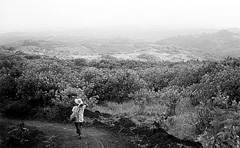The Island at the End of the World
No Pongso Do Tedted no Mondo THE PHILIPPINES / 2004 / Filipino, Itbayaten / Color / Video / 106 min
THE PHILIPPINES / 2004 / Filipino, Itbayaten / Color / Video / 106 min
Director, Script, Photography, Producer: Raya Martin
Editing: Anne Nicomedes
Music: Francisco Horiondo
Source: Raya Martin
Itbayat, the northernmost island of the Philippines, is only accessible for a short period during the year because of frequent typhoons. A city boy with a camera lands on the island by Fokker plane. The wrinkles of old women, the gaze of old men gathered around the radio, the bent backs of the younger ones plowing the fields, the scales of fish being cleaned and gutted on the seashore at dawn, the sky, the ground and the waves all lie before the camera. The director immerses himself in the breath of this island where time flows freely, superimposing himself onto its shores, as the camera warmly trails the carefree, ingenuous islanders.
[Director’s Statement] Known for its vast European-like fields and pristine waters, the Batanes Islands is the northernmost territory of the Philippines. Itbayat, the last inhabited island, rises like a cake above the sharp waves of Bashi Channel. Every year, the island opens itself to visitors during summer. After a short dry spell, the island closes itself off for an almost year-long havoc of storms. Besides its tourist charm, nothing more is known about the place or its people. Sometimes, in extreme cases, Itbayat is nowhere to be found on local maps.
As a young city filmmaker, the appeal of Itbayat comes from the fact that most city dwellers have, ironically, an outdated impression of the islanders and their culture. My drive to seek truths revolves around wanting to understand, more than traditions and practices, a community seemingly isolated from the mainland. The surface characters of the island and its settlers tell both new and familiar stories.
The Island at the End of the World hopes to share that what makes us Filipinos and world citizens, although seemingly divergent, is also one and the same.
 Raya Martin
Raya Martin
Born 1984 in Manila, Philippines, Raya Martin graduated from the University of the Philippines Film Institute in Diliman and has worked as a writer and researcher in local television, newspaper, radio and online magazines. His film Bakasyon, an atmospheric horror short won the Ishmael Bernal Award for Young Cinema at the 6th Makati Cinemanila International Film Festival in 2004. He was a participant at the Berlinale Talent Campus 2005 and was chosen for the 11th session of Cannes Cinéfondation’s Résidence du Festival. He has just completed his first feature Indio Nacional. |
